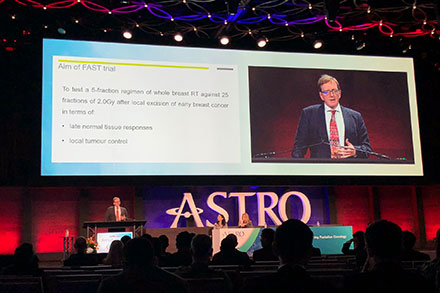Fewer, higher radiation doses safe for early breast cancer treatment, study finds

Long term results from a study presented by a Professor from Keele University have shown that women who received radiotherapy for early-stage breast cancer in fewer, larger doses experienced similarly low rates of late-onset side-effects as those receiving conventional treatment. The results from the study indicate that treatments involving fewer hospital visits can be employed without increasing the risk of long-term side effects.
Keele University’s Professor Murray Brunt presented findings from the study at the 60th Annual Meeting of the American Society for Radiation Oncology (ASTRO).
Professor Brunt is lead author of the FAST trial, which was designed to assess changes in healthy breast tissue after a conventional radiotherapy regimen compared with two shorter treatments that involved delivering higher doses in fewer sessions.
The findings from the multi-centre clinical trial should help doctors discuss the potential risks and benefits of different courses of radiotherapy with their patients. For selected patients, such as the frail, this offers a new choice. The research also provides evidence towards an even larger national trial called FAST-Forward, where professor Brunt is Chief Investigator, which is investigating a change in clinical practice so that women receive a shorter treatment overall.
Professor Brunt, Professor of Clinical Oncology at Keele University and University Hospitals of North Midlands NHS Trust, explained:
“This study says it’s possible to find a regimen that would allow early-stage breast cancer patients to be treated only once a week over five weeks rather than daily over the same time period.
“Findings should help doctors discuss risks and benefits with their patients for various courses of radiation therapy and inform shared decision-making between physicians and patients.”
The trial, led by the Institute of Cancer Research, London, enrolled 915 women with early-stage invasive breast cancer at 18 centres across the UK from 2004 to 2007.
Initial results from the FAST trial, which is funded by Cancer Research UK, indicated that once-weekly, shorter therapy led to similarly low normal tissue effects as conventional therapy at two years following treatment.
These new findings, presented at the 60th Annual Meeting of the American Society for Radiation Oncology (ASTRO), show low side-effects are still recorded ten years after treatment.
Joanne Haviland, Senior Statistician at the Institute of Cancer Research and co-author of the study, said:
“These results support treatment options that are more convenient for patients, resulting in fewer hospital visits and less expensive health services, without increasing the risk of long-term side effects.”
The researchers now plan to investigate cutting radiotherapy treatment down to one week.
Professor Brunt added:
“A schedule like this would have significant clinical and practical implications, such as allowing radiation therapy to be integrated more closely with surgery and other therapies.”

Professor Murray Brunt presents findings from the study at the 60th Annual Meeting of the American Society for Radiation Oncology (ASTRO).
Most read
- Keele University partners with Telford College and NHS to teach new Nursing Associate apprenticeship in Shropshire
- Emotion aware chatbot developed by Keele scientists offers transformative potential for mental health care
- First study of its kind sheds new light on Britain’s ‘forgotten’ World War Two decoy sites
- Keele cardiologist travels to Ethiopia to improve care for heart patients
- Keele academic wins prestigious prize for short story set in Stoke-on-Trent
Contact us
Andy Cain,
Media Relations Manager
+44 1782 733857
Abby Swift,
Senior Communications Officer
+44 1782 734925
Adam Blakeman,
Press Officer
+44 7775 033274
Ashleigh Williams,
Senior Internal Communications Officer
Strategic Communications and Brand news@keele.ac.uk.

